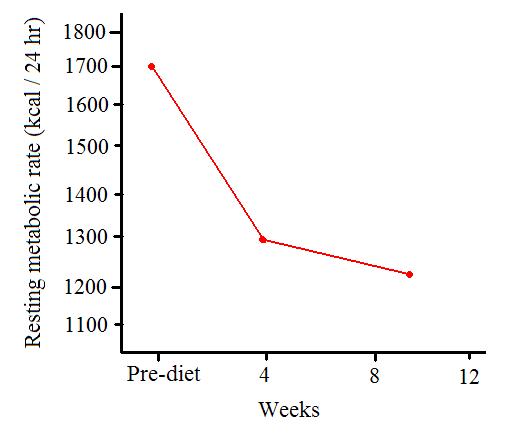Despite realms of scientific evidence suggesting a lack of efficacy, the mainstream medical community continues to dogmatically propagate the myth that forced energy restriction is the treatment of choice for obesity. The purpose of forced energy restriction diets is to create a negative energy balance that causes weight loss. It this regard such diets are successful in the short term because they cause weight loss during the energy restriction period. This may be the reason they are used in the clinical research setting. However, the weight loss includes large quantities of skeletal muscle, and this causes a significant decrease in the resting metabolic rate (RMR) of the individual. The new lower RMR necessitates a new lower daily energy intake in order to maintain metabolic needs, and as such when normal eating resumes there is a significantly increased risk of weight regain and fat accretion.
That obesity is not caused by a simple energy imbalance is provable scientifically with many lines of evidence. While there is an association between weight gain and overeating, the cause and effect are not established. Detailed biochemical studies suggest that obesity is caused not by gluttony on the part of the individual, but by a defect to the insulin receptor signalling mechanism that results in insulin insensitivity.Such insulin resistance increases the partitioning of food away from skeletal muscle for oxidation and towards adipose tissue for storage, where it accumulates and causes systemic inflammation and further metabolic abnormalities. This decreased ability of the skeletal muscles to oxidise glucose or fatty acids is measurable in the postabsorptive state by as a blunted thermic effect of food (TEF). Increasing the thermic effect of food through improving insulin insensitivity is the mechanism to effectively treat obesity.
A decrease in RMR from forced energy restriction diets has been documented in a number of papers. For example, researchers1 investigated the RMR of 7 obese women before, during and after weight loss using indirect calorimetry (resting oxygen and carbon dioxide measurements), and then for 2 months at their new reduced weight. Subjects followed a forced energy restriction diet consisting of ~300 kcal per day (<30 % energy from fat). Significant weight reduction occurred using this very low calorie diet, with mean weight loss being 28.3 kg. However, a significant decrease in fat free mass was observed (18 % of weight loss; 5 kg total). Along with the reduction in fat free mass was seen a 22 % decrease in RMR (figure 1). The decrease in RMR correlated significantly with the loss of fat free mass. During the maintenance period (1100-1400 kcal/d), the body weights of the subjects did not change, but fat free mass increased 3 kg.
Figure 1. Changes in resting metabolic rate with a forced energy restriction diet. The changes to the resting metabolic rate reflect skeletal muscle loss.
In another study2, researchers investigated the effects of forced energy restriction in comparison to ad libitum carbohydrate intakes , both with and without exercise, on the weight loss and RMR of 36 post menopausal obese women. The interesting thing about this study was that all the groups lost weight including the group with access to ad libitum food intakes. These subjects were required to eat complex carbohydrates, and with no energy restriction they lost similar amounts of weight to those following forced energy restriction diets. This supports previous findings that show weight loss with improvements in diet quality, without the need for energy restriction. Those subjects who restricted energy intake lost the most fat free mass when compared to other non-restricted groups. The group who had ad libitum access to food, but who also exercised, lost body fat but gained lean mass, suggesting that they had significantly improved body composition.
Evidence therefore shows that forced energy restriction diets causes a deterioration in the physical condition of the individual. However, such evidence is completely overlooked by the mainstream medical community. Interestingly, 26 of the 36 women enrolled in the exercise and energy restriction study2 could not adhere to the restrictions, suggesting that the intent to treat analysis of this data would have shown it to be a dismal failure. That weight loss is possible through ad libitum food intakes is clearly supported by a large number of studies in the literature. Energy restriction is not required, because a positive energy balance in not the cause of obesity. The cause of obesity is insulin resistance, and only treatments that address this poor insulin sensitivity will be effective at causing beneficial changes to the insulin receptor signalling pathway that result in permanent reversal of abdominal obesity.
That exercise is helpful only in the presence of adequate energy intake is also evident. Exercise is beneficial because it improves insulin sensitivity and increases the oxidation of glucose and fatty acids by skeletal muscle, decreasing the flow of energy to adipose tissue. It is not beneficial for the reasons cited by mainstream medicine, that is to say it does not cause weight loss because it creates a negative energy balance. Lack of exercise is provably not the cause of obesity, as many individuals who do little physical activity are not obese. While some believe that exercise causes weight loss because it increases energy expenditure, the confounding variable in this theory is the ability of exercise to improve insulin sensitivity. That resistance training causes superior fat loss to aerobic exercise, is explained by its ability to improve insulin sensitivity to a greater degree while increasing lean mass.
RdB

